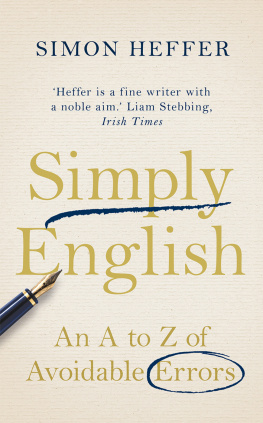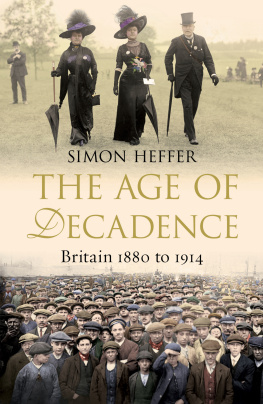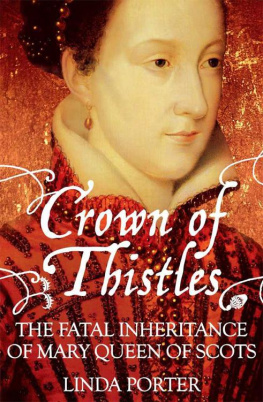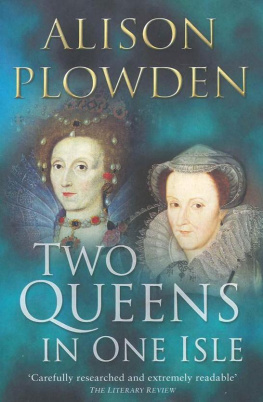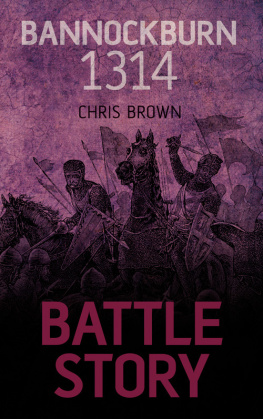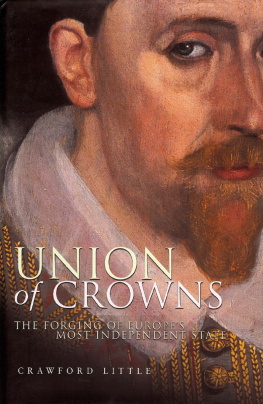
First published in Great Britain in 1999 by Weidenfeld & Nicolson
This edition first published in the UK in 2012 by Head of Zeus Ltd.
Copyright Simon Heffer, 1999, 2012
The moral right of Simon Heffer to be identified as the author of this work has been asserted in accordance with the Copyright, Designs and Patents Act of 1988.
All rights reserved. No part of this publication may be reproduced, stored in a retrieval system, or transmitted in any form or by any means, electronic, mechanical, photocopying, recording, or otherwise, without the prior permission of both the copyright owner and the above publisher of this book.
This is a work of fiction. All characters, organizations, and events portrayed in this novel are either products of the authors imagination or are used fictitiously.
9 7 5 3 1 2 4 6 8
A CIP catalogue record for this book is available from the British Library.
ISBN (E) 9781781850183
Head of Zeus Ltd
Clerkenwell House
45-47 Clerkenwell Green
London EC1R 0HT
www.headofzeus.com
In Memoriam
JAMES HEFFER
A Soldier of the Great War
Contents
This tract was written in 1998-99, shortly before the first elections to the Scottish Parliament in May 1999. When it was published it was reviewed warmly by Alex Salmond, now First Minister of Scotland. Critics on the left dismissed it because it contradicted the Labour governments assertion that devolution would strengthen the United Kingdom. Critics on the right dismissed it because it advocated a life after Unionism. I was motivated in writing the book by the dishonesty of both of those positions, which were apparent long before I put pen to paper. But I was also motivated by a deep-seated belief that one of the most tragic mistakes in the modern history of the British Isles was the failure of parliament to pass Gladstones Home Rule Bill of 1886. It was clear at least to me by the late 1990s that Scotland was manifesting an increasingly strong determination to leave the Union with England. All I was trying to do was to prepare the mind of English and, indeed, quite a few Scottish politicians for the likelihood of a democratic demand to leave the Union: and the sheer impossibility, morally and politically, to seek to coerce those making that demand as and when they uttered it.
Thirteen years later, Scotland is governed by the Scottish National Party. A referendum on independence is promised for 2014. These things seemed highly unlikely in 1999, although not to me and, I presume to say, to Mr Salmond. With the debate now nearing some sort of resolution, it seemed appropriate to re-publish these thoughts. They are essentially about why the English have nothing to fear from liberating their partners in this enterprise, and they seem as valid now as they were when I wrote them.
Simon Heffer
Great Leighs
17 April 2012
Only the most unobservant can have missed the latest great fact in what the Victorians so charmingly called our island story: that a majority of the Scots wish to loosen their nations antique ties with England. The point was spectacularly confirmed at the general election of 1 May 1997, when the main Unionist party in Scotland was unable to secure the return of a single candidate to the United Kingdom parliament at Westminster. The message was relayed even more loudly at the referendum on the Scottish parliament held in September 1997, when the Scots voted by a substantial majority to establish such a legislative body. At almost every opinion poll since then it has been shown that public support for the main separatist party in Scotland, the Scottish Nationalist Party, is growing steadily. In September 1998, exactly a year after the referendum, 50 per cent of Scots questioned in an opinion survey wanted their country to be independent. Another survey, taken three months earlier, made the more telling point that a majority of Scots, including many who do not wish for independence, nonetheless expect their country to be independent from England within about fifteen years.
The phenomenon of Scottish separatism is growing not least because among the young it has become a fashionable attitude. The glib explanation for why this should be so has for the last few years been that this generation was much moved by the film Braveheart, in which mediaeval Englishmen are seen brutalising, oppressing and generally being unsportsmanlike towards mediaeval Scotsmen. It may be that this fairly typical piece of Hollywood anti-Englishry acted as useful propaganda for the Scots nationalist cause, but that cause was already well advanced before Mr Mel Gibson lent his reputation to it, and for reasons that we shall shortly explain.
Whenever the movement really took off, it is now entrenched. An ICM survey carried out in Scotland for the Scotsman newspaper in June 1998 showed that 63 per cent of people in the eighteen to thirty-four age group would prefer to see Scotland as an independent country. The very mindset of the Scots about their place in the Union, their very expectations for the future, are being steadily revised and altered. It is not just that young people are being bombarded by propaganda in the media; they are growing up, in their families and their schools, imbued with the idea that the Union is detrimental to them, their freedoms, and their right to self-expression.
Those who feel this way have had other, broader sources of influence. Europe in the true sense of that term has only recently experienced a great flowering of nationalism. It is less than ten years since joyous Germans dismantled the Berlin Wall. Nations that existed only in the mind a decade ago Slovakia, Slovenia, Estonia and the rest are now literally on the map. Their renascence has helped change decades-old perceptions of nationalism. The two world wars meant that, to a modern audience, the concept smacked of aggression, domination and destruction, racialism and even genocide. Now, with the dismantling of the Soviet empire, nationalism is increasingly seen as representing something explicitly different: liberation from foreign control, social and economic freedom, decentralisation and cultural diversity. Even though the Scots have no recent history of suffering oppression other than in the imaginations of some of the more eccentric of them they have, in certain respects, latched on to the new public mood about nationalism, and in their aspirations are clearly benefiting from it. The sense of what Scottish nationalists seek to do is not the issue in this regard. A liberal nation like England should, and must, recognise the Scots right to pursue their own identity, however costly a mistake it might prove for them.
If there is writing on Hadrians Wall, it reads that the English should leave Scotland to its own devices. The subtext is that the Union of England and Scotland, which was made principally for economic reasons almost three hundred years ago, no longer confers sufficient benefit upon the Scots to make the sacrifice of their national independence worthwhile. It was in recognition of this mood, and in acknowledgement of the electoral considerations that hinge upon it, that the offer of devolution was made by a United Kingdom government. However, the measure of self-rule afforded to the Scots by devolution, with its limited tax-raising powers and lack of control over defence, foreign, employment, transport and other economic policies, is plainly not enough for the tastes and ambitions of many in Scotland. For the moment, this is a most one-sided debate: all the expression of grievance has been on the side of the Scots. It might be considered pointless now to have a referendum in England about whether that country should irrespective of what Scotland tries or decides to do become independent, however much the English might deserve the sort of consideration that has already been given to the Scots and the Welsh, and however unintentionally amusing the exercise might be. There is no reason why it should not take two to make an independence movement; there is no reason not to ask the English whether or not they would like to be shot of the Scots, although the Scots appear to have reached that point first. Sadly, this basic democratic right will not be afforded to the English. In the drama that may be about to unfold, they must accept, it seems, the role of the completely passive partner. That is only the first, but most fundamental, way in which the English have been betrayed by the political class of all parties that claims to govern them in their interests.
Next page

